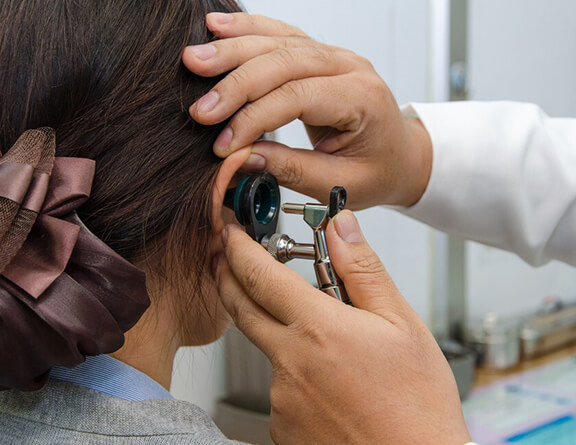
Navi mumbai
USFDA Approved Procedures
Minimally invasive. Minimal pain*.
Insurance Paperwork Support
1 Day Procedure


Diagnostic Tests and Treatment
To ensure successful treatment of the condition, it is important for your doctor to diagnose it accurately. Diagnosing otitis media surgery typically involves a series of tests, such as:
In some cases, your doctor may suggest a tympanometry, in which a small device is used to measure the pressure between the eardrum and ear canal.
Otolaryngology specialists may conduct a thorough physical examination of the ears, nose, and throat.
Hearing test to evaluate if the patient has hearing loss.
Through the above tests and procedures, your doctor can accurately determine the diagnosis of otitis media surgery and recommend the best treatment option.
Delivering Seamless Surgical Experience in India
Your safety is taken care of by thermal screening, social distancing, sanitized clinics and hospital rooms, sterilized surgical equipment and mandatory PPE kits during surgery.
A dedicated Care Coordinator assists you throughout the surgery journey from insurance paperwork, to free commute from home to hospital & back and admission-discharge process at the hospital.
Our surgeons spend a lot of time with you to diagnose your condition. You are assisted in all pre-surgery medical diagnostics. We offer advanced laser and laparoscopic surgical treatment. Our procedures are USFDA approved.
We offer free follow-up consultations and instructions including dietary tips as well as exercises to every patient to ensure they have a smooth recovery to their daily routines.
Here are some things you can do to cure otitis media at home:
Ear drops are typically used in conjunction with other treatments. Generally, they are used as a short-term treatment to reduce inflammation and pain, and to stop the infection from spreading. If your symptoms do not improve after using ear drops, contact your doctor for further assessment.
The amount of pain experienced with the surgery can vary and is largely dependent on the individual’s tolerance and the specific procedure that is being performed. Generally, the procedure is minimally-invasive and any pain experienced will be short-lived. Post-operative care and appropriate medications can help reduce the discomfort and ensure a successful outcome.
The first line of treatment for otitis media involves managing the symptoms with pain relief medications, such as ibuprofen and acetaminophen. Sometimes nasal decongestants and antihistamines may be recommended as an adjunct or to reduce the pain associated with otitis media. Antibiotics may be prescribed if your doctor suspects an infection is involved. Surgery is rarely needed.
At Pristyn Care, we understand that your ENT day care procedure might be covered under insurance. We provide complete insurance assistance and guide you through the entire process so you don’t have to worry about the cost. Our team is available to answer all your queries and help you at every step of the way. All you need to do is ask your insurance provider to check if your treatment cost is covered and we will take care of the rest.
The long term effects of this condition can be more serious. In rare cases, otitis media can lead to speech or hearing impairments, facial paralysis, or conductive hearing loss. Individuals who experience chronic otitis media may also be more prone to other infections due to weakened immune systems. Consulting a healthcare professional can help reduce risk of serious long-term effects as they provide treatment for acute otitis media and monitor it for recurrence.
Generally, patients might require 2 to 5 days off from their normal activities. Although there is a chance of swelling and discomfort, most patients return to their regular activities and work within the first week following surgery. There may also be a drainage tube in the ear, which may remain for a few weeks after the surgery. To ensure a successful recovery and avoid any further complications, it is important to follow all instructions carefully, including those provided by your physician.
If you are experiencing any of the following symptoms of an ear infection, it is important to seek emergency medical care:
Do not hesitate to contact a medical professional if you experience any of these warning signs.
Otitis media is an inflammation inside the ear that can cause pain and discomfort. While it’s best to get professional medical treatment, there are several things you can do at home to help prevent the condition from occurring, or turning severe.
The first step is to try to prevent otitis media from occurring in the first place by avoiding smoking, keeping your ears clean and dry, and managing allergies. If you can’t avoid exposure to allergens, use an over-the-counter, non-prescription nasal spray or antihistamine to manage the symptoms.
If otitis media has already set in, home remedies may provide relief. These include using a warm compress on the ear to reduce swelling and inflammation, using a humidifier to reduce ear discomfort, and using over-the-counter pain relievers, such as ibuprofen or acetaminophen.
It’s also important to keep your child hydrated and get plenty of rest to help the body fight the infection. You should also avoid air travel if possible and avoid cotton swabs or Q-tips for cleaning the ear.
By following these tips and best practices, you can prevent otitis media or avoid further discomfort. However, if you still get it, reach out to your doctor for further guidance and treatment options.
If you want to get surgery to cure otitis media, look no further than Pristyn Care.
You have many reasons to choose Pristyn Care over others to undergo otitis media surgery.
Listed below are some reasons why you should choose Pristyn Care:
Consider Pristyn Care before having otitis media surgery.
.svg)
.svg)
.svg)